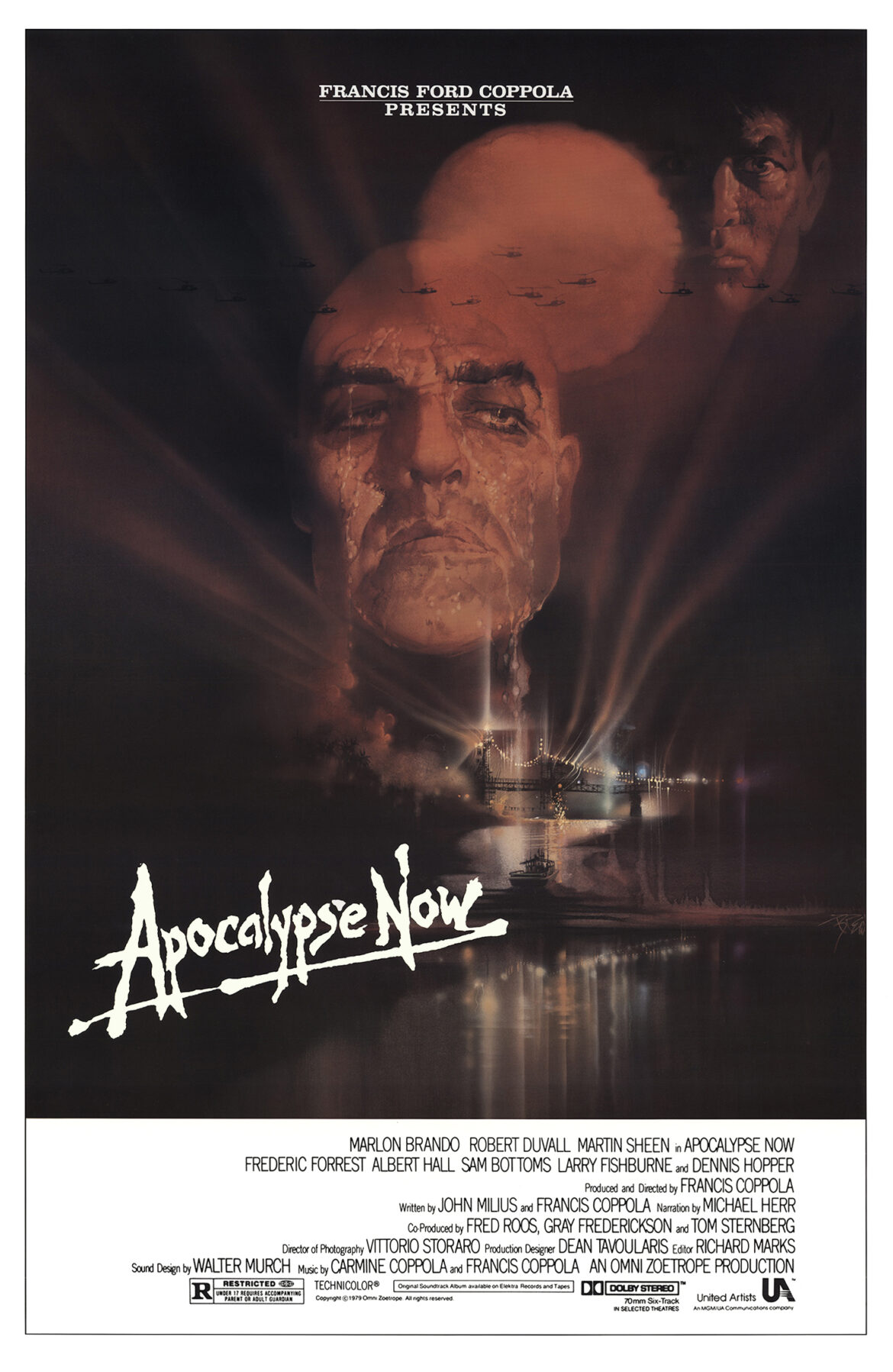Apocalypse Now (1979) – A Visceral and Haunting Journey into the Heart of Darkness
Type: Movie
Country: USA
Genre: War, Drama
Release Date: August 15, 1979
Duration: 153 minutes (Theatrical Cut)
Director: Francis Ford Coppola
Production Companies: American Zoetrope, United Artists
Cast: Martin Sheen, Marlon Brando, Robert Duvall, Frederic Forrest, Dennis Hopper, Laurence Fishburne
Quick Review:
“Apocalypse Now” (1979), directed by Francis Ford Coppola, is a monumental war film that delves deep into the horrors of the Vietnam War and the darkness within the human soul. Renowned for its intense performances, especially from Marlon Brando and Martin Sheen, and its innovative filmmaking techniques, “Apocalypse Now” remains a powerful and enduring classic in cinema history.
Plot Summary:
“Apocalypse Now” is a loose adaptation of Joseph Conrad’s novella “Heart of Darkness,” set against the backdrop of the Vietnam War. The story follows Captain Benjamin Willard (Martin Sheen), a U.S. Army officer tasked with a covert mission to assassinate Colonel Walter E. Kurtz (Marlon Brando), a rogue Special Forces officer who has gone insane and set up a brutal cult-like regime in the Cambodian jungle.
As Willard journeys upriver into the heart of darkness, he encounters various eccentric and disturbing characters, including Lieutenant Colonel Bill Kilgore (Robert Duvall), who is obsessed with surfing amidst the chaos of war. The journey becomes a nightmarish odyssey, reflecting the internal and external chaos of the Vietnam conflict.
Willard’s voyage is marked by surreal and harrowing encounters, ultimately leading him to Kurtz, whose descent into madness epitomizes the film’s exploration of the human condition and the impact of war on the psyche.
Characters and Performances:
- Martin Sheen as Captain Benjamin Willard: Sheen delivers a complex and introspective performance as Willard, portraying the character’s psychological unraveling with intensity and depth. His internal conflict and moral ambiguity are central to the film’s exploration of darkness and sanity.
- Marlon Brando as Colonel Walter E. Kurtz: Brando’s portrayal of Kurtz is both enigmatic and chilling. His performance, marked by a commanding presence and haunting monologues, encapsulates the film’s exploration of madness and moral decay.
- Robert Duvall as Lieutenant Colonel Bill Kilgore: Duvall’s role as the war-obsessed Kilgore is both memorable and iconic. His portrayal of Kilgore’s obsession with surfing amidst the conflict adds a surreal and darkly comedic element to the film.
- Frederic Forrest as Jay “Chef” Hicks: Forrest brings authenticity and emotional depth to his role as Chef, one of Willard’s crew members. His character’s vulnerability adds a human dimension to the film’s portrayal of the horrors of war.
- Dennis Hopper as Photojournalist: Hopper’s portrayal of the drug-addled photojournalist adds a layer of madness and unpredictability to the film, highlighting the pervasive sense of disorientation and chaos.
Direction and Cinematography:
Francis Ford Coppola’s direction is both visionary and audacious, capturing the visceral impact of war and the psychological turmoil of its characters. His approach to storytelling, marked by a blend of surreal imagery and intense realism, creates a haunting and immersive experience.
The cinematography by Vittorio Storaro is visually stunning, using dramatic lighting and inventive camera angles to enhance the film’s atmosphere. The lush, oppressive jungle and chaotic battle scenes are captured with a sense of grandeur and immediacy, contributing to the film’s impact.
Music:
The film’s soundtrack, featuring a mix of classical and contemporary music, plays a crucial role in setting the tone and enhancing the narrative. The use of Wagner’s “Ride of the Valkyries” during the helicopter attack sequence is particularly iconic, symbolizing the surreal and destructive nature of war. The haunting score by Carmine Coppola and Francis Ford Coppola further underscores the film’s emotional and thematic depth.
Why It Endures:
“Apocalypse Now” endures as a landmark film due to its profound exploration of war’s impact on the human psyche and its innovative approach to storytelling. Its blend of surrealism, intense performances, and powerful cinematography establishes it as a timeless and influential work in cinema.
The film’s critical acclaim, including multiple Academy Awards and nominations, reflects its significance and enduring impact. “Apocalypse Now” remains a seminal work for its unflinching portrayal of the darkness within and the chaos of war.
In Conclusion:
“Apocalypse Now” (1979) is a groundbreaking and haunting war film that delves into the heart of darkness with unflinching intensity. Directed by Francis Ford Coppola and featuring unforgettable performances from Martin Sheen and Marlon Brando, the film’s exploration of war and madness continues to resonate with audiences. Its innovative direction, stunning cinematography, and powerful music ensure that “Apocalypse Now” remains a classic and influential work in the annals of cinema.


